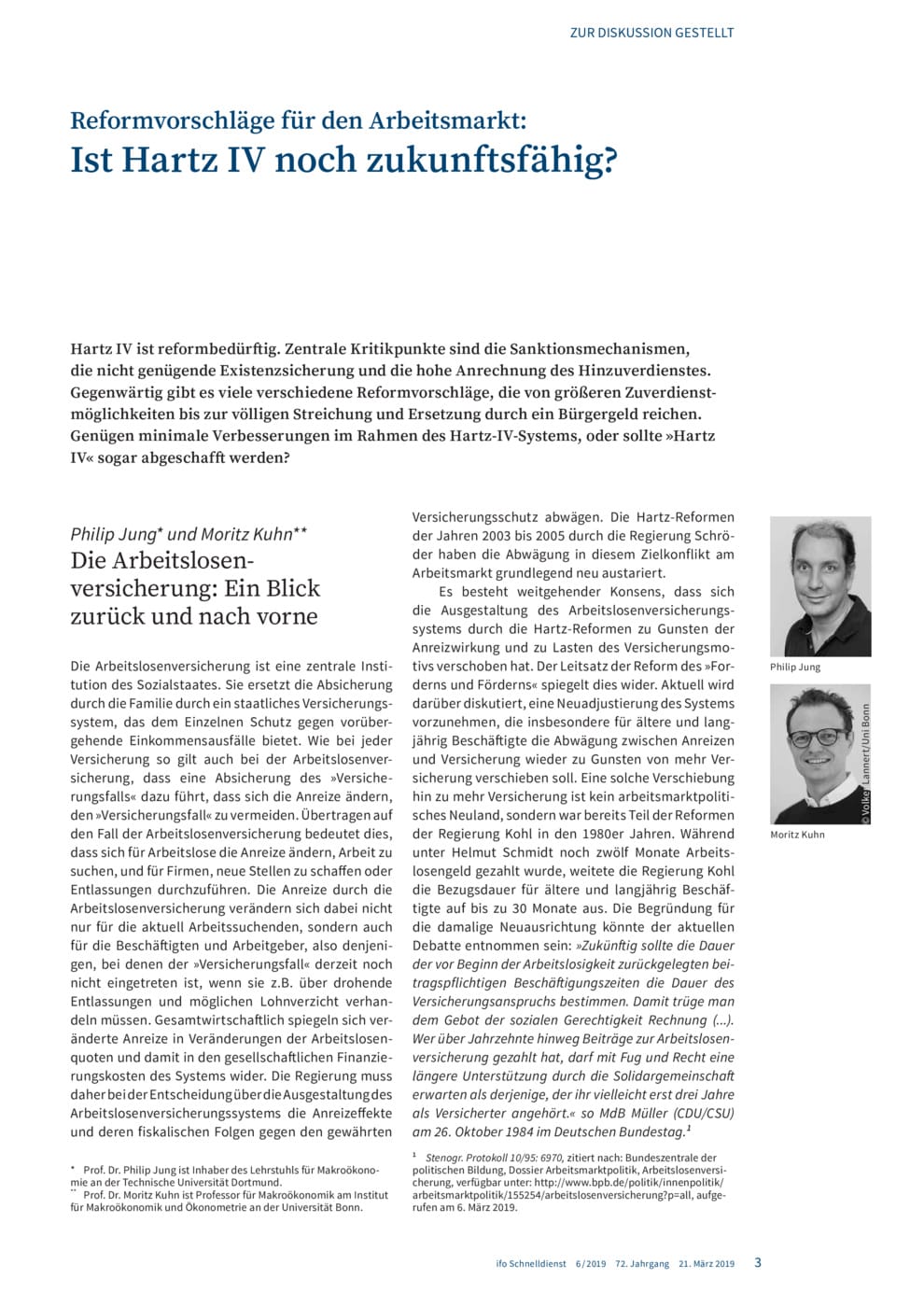Proposed labor market reforms: Is Hartz IV still sustainable?
ifo Institut, München, 2019
ifo Schnelldienst, 2019, 72, Nr. 06, 03-25

Many proposals as to how to reform Germany’s second level of unemployment benefits (Arbeitslosengeld II, also known as Hartz IV) are currently under discussion. Options include extending the period of entitlement to claim the first level of unemployment benefits (Arbeitslosengeld I), increasing the supplemental earnings threshold, or even introducing a basic income scheme to replace Hartz IV completely. How do these proposals rate? Philip Jung (TU Dortmund) and Moritz Kuhn (University of Bonn) consider a simple extension of the period of entitlement to claim unemployment benefits, as proposed by the SPD, to be an inappropriate solution. Because it would lead to more redundancies and fewer new hires, this measure would increase the average social security contributions paid by all workers. This in turn would favor older workers with relatively stable jobs at the expense of younger workers and those with less stable employment relationships. Anke Hassel (Institute of Economic and Social Research, WSI) proposes that, 15 years after Germany’s biggest labor market reform of the post-war period, labor market policy should be revised. She refers to a new study that shows that the original Hartz reforms have reduced the duration of unemployment, but not the scope. The plans currently on the table could help increase workers’ involvement in positive economic development and would take today’s labor market conditions into account. Robert Habeck (Bündnis90/Die Grünen) wants policy to reflect how labor market conditions have changed. In contrast to when Hartz IV was first introduced, the problem is no longer mass unemployment but the shortage of skilled workers. Today, the challenge is not stagnation but change, and the key political priority is no longer budgetary consolidation but social cohesion. The key to a functioning social community is that vital needs are met and nobody is at risk of being pushed to the margins of society. In order to achieve this, there needs to be a new state guarantee system that encourages people to work and curbs the low-wage sector. Matthias Knuth (Institut Arbeit und Qualifikation, University of Duisburg-Essen) considers the SPD’s proposals to be “thought-provoking ideas definitely worthy of discussion, but not a blueprint” for a practicable “reform of the reforms.” Unemployment insurance should not be changed to benefit people already in the system, by extending the period of entitlement to unemployment benefits. One approach would be to ensure that the initial period of basic income support for all those whose entitlement to unemployment benefits has expired preserves their assets and maintains their standard of housing. This period should, however, be limited to one year. Alexander Spermann (FOM Hochschule für Erwerbstätige in Cologne) calls for “bold, long-term experiments, not just microsimulations” of the kind that generally form the basis for all reform proposals. These should be enjoyed with caution, since the figures they present give the impression that people’s behavior can be precisely calculated. In reality, however, many more variables come into play than those accounted for in such a model. Elements of a universal basic income could actually be tested over the long term at low fiscal cost. Hans Peter Grüner (University of Mannheim) discusses the economic interests—both of the trade unions and of the employers’ associations—behind the ongoing dispute about the Hartz legislation, and shows that further development of the reforms is more likely to be politically workable if the associated gains are more widely distributed. Maximilian Blömer, Clemens Fuest, and Andreas Peichl (ifo Institute) put forward a reform proposal from ifo that focuses on improving the basic income support system’s employment incentives. The aim of the proposal is to reduce disincentives that currently prevent recipients of basic income support from earning a higher income of their own and to overcome or at least reduce dependence on transfers. They also compare the ifo proposal with other reform concepts currently under discussion.